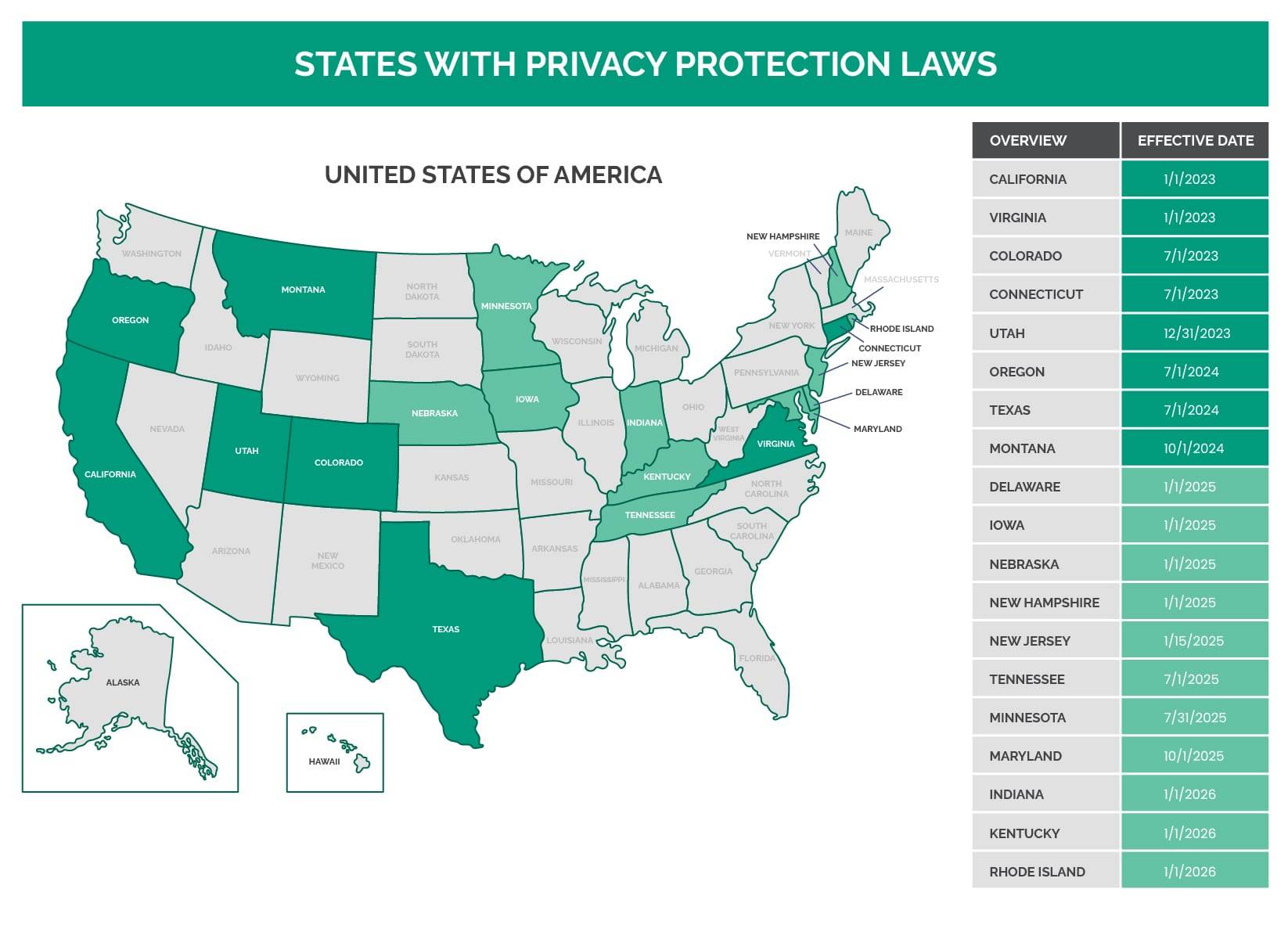
Data privacy is no longer just a concern for tech companies. It has become a significant aspect of the printing industry, particularly in direct mail, where personalization and customization drive better results.
Indeed, direct mail shifts from generic mass mailings to highly personalized campaigns driven by AI and big data.
This transition comes with an increasing maze of privacy regulations around the use and protection of customer data.
State laws, proposed federal legislation and international standards are tightening around how digital printing uses and protects customer data.
For print companies, this means balancing innovation with compliance. Adapting to these new regulations isn’t optional; it’s essential.
The big question is, how will businesses adapt while continuing to innovate using big data?
The Intersection of Data Privacy and Digital Printing
Digital printing leverages data in numerous ways to help brands boost customer engagement and achieve marketing goals.
Data Applications
- Customized Direct Mail uses data to create personalized messages and offers tailored to individual recipients. The goal is to boost engagement and response rates.

- Targeted Advertising Campaigns leverage consumer data to focus print ads based on demographics, interests, and buying behaviors.
- Transactional Printing integrates marketing content into essential documents like invoices or statements to provide relevant offers based on the recipient’s purchase history.
- Variable Data Printing allows for on-demand changes to text, graphics, and images in print runs to enable hyper-targeted communication.
- Geo-Targeted Mailers utilizes location data to send region-specific promotions and messages to a targeted audience.
- Behavioral Trigger Printing automates print communication triggered by specific customer actions or events, such as a recent purchase or abandoned cart.
Privacy Concerns
Businesses must manage the data they’re printing while also meeting numerous privacy standards worldwide to avoid compliance issues.
Each approach—whether tailoring messages, leveraging consumer data for targeted ads, or integrating personalized offers into transactional documents—requires careful handling of sensitive customer information.
Different states and countries enforce varied rules. These rules make compliance challenging for print companies operating across multiple jurisdictions. The risks from non-compliance are significant, including fines, legal actions, and reputational damage.
The Regulatory Landscape
The U.S. data privacy regulations framework presents a complex patchwork of state laws, each imposing unique requirements and standards.
There needs to be a comprehensive federal law in place.
Printing enterprises must navigate diverse state-specific rules like the California Privacy Rights Act (CPRA) and the Colorado Privacy Act (CPA).
The potential for a unified federal law, such as the proposed American Privacy Rights Act, hangs in seemingly perpetual limbo.
Companies must manage the challenges of multi-state compliance. This section explores regulations, their implications, and their potential impact on the printing industry.
A Patchwork of State Laws and the Potential for Federal Law

Map shows U.S. states with privacy protection laws in effect or that have passed.
The current landscape in the U.S. consists of a complex mix of state-level privacy laws, each with its requirements and standards.
This patchwork is mainly due to the need for a comprehensive federal data privacy law.
For example, the California Consumer Privacy Act (CCPA), California Privacy Protection Agency (CPRA) Virginia’s Consumer Data Protection Act (VCDPA), Colorado Privacy Act (CPA), and other state laws like those in Utah, Connecticut, and Montana each impose unique obligations on businesses operating within or targeting consumers in those states.
Laws such as the CPRA grant California residents rights over their data, mandate companies to enable opt-out mechanisms, and impose strict data protection requirements, including the right to rectification and restrictions on using sensitive personal information.
Meanwhile, new laws like Florida’s Digital Bill of Rights (effective July 2024) and the Texas Data Privacy and Security Act (effective July 2024) will further expand the regulatory scope nationwide.
On the federal front, the American Privacy Rights Act has been proposed to create a unified standard for data privacy across the U.S. However, it faces significant legislative hurdles before enactment, leaving businesses to navigate the morass of state regulations.
Overview of Key Regulations Affecting the Printing Industry
State-Level Privacy Laws
- California Privacy Rights Act (CPRA): This act imposes significant data protection obligations, including allowing consumers to access, delete, and correct personal information and mandating data minimization and retention policies.
- Virginia’s CDPA and Colorado’s CPA: Provide rights similar to the CPRA but with variations in scope and applicability.
- Upcoming Laws in 2024: Include Montana’s Consumer Data Privacy Act (effective October 2024) and Oregon’s Consumer Privacy Act (effective July 2024), adding to the complexity of compliance for businesses operating across multiple states.
Federal Regulatory Environment
- Federal Trade Commission (FTC): Enforces various sector-specific privacy laws (like COPPA for minors, HIPAA for health data, GLBA for financial data, etc.) under the Federal Trade Commission Act, which prohibits unfair or deceptive trade practices. The FTC can take enforcement action against companies that fail to implement adequate data security measures or comply with self-regulatory principles.
International Privacy Laws
- General Data Protection Regulation (GDPR): The most comprehensive data privacy law to date applies to any business processing personal data of EU residents. Its requirements include obtaining explicit consent, ensuring data subjects’ rights, and implementing stringent security measures.
- Canada’s Personal Information Protection and Electronic Documents Act (PIPEDA) and the proposed Consumer Privacy Protection Act (CPPA): Regulate data privacy in Canada, emphasizing individual consent and transparency in data handling.
Cost and Complexity of Compliance
Compliance comes with substantial costs for multi-state or international operations. Each new regulation adds layers of complexity, particularly for businesses operating across state lines or internationally.
The need to conduct Data Protection Impact Assessments (DPIAs), establish robust opt-out mechanisms, and adhere to various data retention policies imposes significant administrative and financial burdens.
Implications for Digital Printing Companies
Direct Impacts of Specific Laws
Requirements for Data Protection Impact Assessments (DPIAs) and opt-out mechanisms, as seen in the CPRA, CPA, and other laws, directly affect how digital printing companies manage consumer data.
Financial Risks of Non-Compliance: Companies risk significant fines and reputational damage if they fail to comply with these regulations. For example, the CPRA imposes fines of up to $7,500 per violation.
Operational Adjustments
Printing companies must adapt their data management practices, including obtaining explicit consent for data use, providing transparent data handling policies, and enabling consumer rights such as deletion and data access.
Compliance involves implementing advanced data security measures, including encryption and secure storage solutions, to meet regulatory standards and prevent data breaches.
Data Security in Digital Printing
The digital printing industry faces unique data security challenges as it increasingly relies on data-driven processes and personalized marketing materials.
Strong data encryption, secure storage solutions, and regular audits are critical to safeguarding sensitive information and maintaining customer trust.
The Need for Strong Data Encryption and Secure Storage
Encrypting all data transmitted between devices, servers, and printers prevents interception and unauthorized access.
Secure data storage is equally crucial
Companies must establish and monitor robust storage solutions to protect against data breaches, loss, and unauthorized access.
Regular audits and security updates strengthen defenses by identifying and addressing potential vulnerabilities.
Risks of Mishandling Sensitive Data
Handling sensitive data, such as Personally Identifiable Information (PII), involves significant risks, especially in personalized marketing.
Missteps in managing PII can lead to severe consequences, including data breaches, legal penalties, and loss of customer trust. Print services providers and direct mail production plants must implement strict access controls, such as user authentication protocols and secure print release systems, to ensure that only authorized personnel can access or print sensitive documents.
Importance of Maintaining Customer Trust
Mishandling data can damage reputation and customer relationships. Companies should adopt transparency in data management practices, regularly update privacy policies, and provide clear information to customers about how their data is collected, processed, and protected.
Companies can differentiate themselves in a competitive market by demonstrating a commitment to data security.
Additional Security Measures
Companies can deploy IDS/IPS to detect and neutralize threats before they escalate. Using AI, anomaly detection, and automated security tools can further enhance the ability to identify risks and respond more quickly.
Strong patch management and consistent software and firmware updates help close existing security vulnerabilities, while a zero-trust security model ensures that all network activity is thoroughly monitored and verified.
Risks and Opportunities of AI and Data Privacy in Printing

AI enables printers to optimize operations, improve print quality, and create highly targeted marketing materials.
The growing reliance on AI also presents unique challenges, particularly around data privacy and security.
Opportunities in AI-Driven Printing
- Customized Offers: AI enables printers to create highly personalized, competitively priced offers, often better than online alternatives. By analyzing customer preferences and purchasing patterns, direct marketers can design ad materials tailored to individual needs.
- Targeted Products and Messaging: AI helps craft messages and select products that resonate with specific audiences. For example, AI can suggest “the thing-a-ma-bob you’ve been looking at.” Such a message creates a sense of relevance and urgency. Artificial intelligence can also adjust the tone, voice, and emotional appeal of the message by leveraging tactics like fear of missing out or scarcity to drive action.
Risks from AI in Printing and Data Privacy Concerns
AI’s integration into printing brings several risks, particularly regarding data privacy.
- Compliance with Privacy Regulations: Printing companies must navigate an increasingly complex landscape of privacy laws, such as the CCPA, GDPR, and various state-specific regulations. AI-driven personalized marketing efforts require handling large volumes of personal data, which can raise privacy concerns and expose companies to legal risks. Failure to comply with data privacy laws can lead to substantial fines, legal actions, and reputational damage.
- Penalties and Legal Liabilities: As regulations grow more stringent, direct mail printers using AI-driven data analytics could face penalties for privacy violations. For example, if AI uses customer data without proper consent, it may violate any number of regulations, leading to stiff penalties. Non-compliance can also result in lawsuits.
Costs Associated with AI and Data Privacy Compliance
AI integration into printing requires substantial investment to ensure compliance with data privacy regulations.
- Regulatory Compliance Costs: Keeping pace with varying privacy laws is challenging for companies operating in multiple states. Businesses must allocate resources to compliance software, hire privacy officers, and conduct regular audits to meet all regulatory requirements.
- Data Security Investments: Protecting data used in AI-driven processes demands robust security measures, such as advanced encryption, secure storage, and intrusion detection systems. Implementing and maintaining these security measures can be expensive, but they are essential to prevent data breaches and avoid costly penalties.
- Fines and Penalties: The consequences of non-compliance with laws such as the UCPA and DPDPA are steep, with hefty fines imposed for breaches or mishandling of sensitive data. Businesses must bolster their compliance efforts to avoid these financial penalties.
Mitigating Privacy Risks in Digital Printing
Businesses can align with evolving privacy regulations while enhancing customer loyalty and differentiating themselves in a competitive market by adopting best practices for compliance and implementing operational adjustments.
Best Practices for Compliance
To effectively mitigate privacy risks, digital printing companies must implement robust practices to ensure compliance with evolving data privacy regulations:
| Secure Data Handling: To safeguard sensitive information, implement encryption protocols for data in transit and stored on local or cloud storage. Strict access controls should ensure that only authorized personnel can handle the data. Continuously update security measures to address emerging vulnerabilities and prevent potential breaches. | |
| Clear Privacy Policies: Develop and maintain privacy policies outlining how customer data is collected, stored, used, and shared. Ensure policies are understandable and accessible to all customers. | |
| Obtaining Customer Consent: Obtain explicit customer consent that complies with all laws and regulations before collecting or processing personal information. This includes providing customers with clear opt-in and opt-out options, especially for data used in personalized marketing campaigns or shared with third parties. | |
| Regular Compliance Audits: Conduct internal audits to ensure all data handling practices align with current privacy laws and regulations. Audits should cover all aspects of data management, from collection and storage to processing and disposal. |
Operational Changes for Privacy Law Alignment
To align with data privacy laws, printing companies may need to implement several operational changes:
- Adjusting Data Collection Practices: Review and, if necessary, limit the amount of data collected from customers to only what is necessary for business operations. Ensure that data collection methods are transparent and comply with privacy laws.
- Data Storage Enhancements: Strengthen data storage practices by using secure servers and implementing redundancy and backup solutions to prevent data loss. Employ data minimization techniques to reduce the amount of data retained and ensure it is kept only for as long as necessary.
- Processing Adjustments: Implement robust data processing protocols that prevent unauthorized access or use of customer information. Utilize pseudonymization or anonymization techniques where possible to protect data during processing.
Enhancing Customer Trust through Data Privacy
Data privacy efforts mitigate risks and serve as a powerful tool for building customer trust:
- Building Trust Through Transparency: Companies that emphasize transparency in their data protection efforts can earn customer trust, with clear communication on data handling, instilling confidence in the security and responsible use of their information.
- Market Differentiation: Adherence to stringent data privacy standards can separate a printing company. Companies prioritizing privacy and security will likely attract customers who value data protection and seek trustworthy providers.
- Reputation Management: Effective data privacy practices reduce the risk of breaches or legal violations, helping maintain a positive reputation in the market. Companies with solid privacy measures are likelier to enjoy long-term customer relationships and positive word-of-mouth referrals.
Privacy Compliance in Digital Printing is An Opportunity for Growth
Privacy in the printing industry is no longer just a compliance checkbox but a strategic advantage.
Upholding privacy regulations nurtures customer trust, enhances loyalty, and distinguishes businesses from competitors. By implementing strict data protection practices, print companies can leverage regulatory challenges as growth opportunities and position themselves at the forefront of secure and personalized customer engagement.
Contact Kao Collins about inks for direct mail, publishing, and variable-data printing.
Inks and Equipment related to direct mail and variable data printing
X-BAR – The X-BAR print module is designed as a modular drop-in unit, making it an excellent choice for supporting variable data printing on traditional analog systems like flexo and offset presses.
SIGMA+ – This solvent ink from Kao Collins, designed for HP 45si thermal inkjet technology, offers extended decap times, rapid drying on non-porous substrates, high adhesion on difficult surfaces, and compliance with non-CMR and PFAS-free standards, making it ideal for high-quality, durable prints in packaging and labeling applications.
U.S. States with Privacy Laws
Overview |
Key Facts |
Effective Date |
| CALIFORNIA
The California Privacy Rights Act (CPRA) strengthens data privacy protections for California residents, building on the California Consumer Privacy Act (CCPA). |
|
1/1/2023 |
| VIRGINIA
The Virginia Consumer Data Protection Act (VCDPA) establishes privacy rights and regulations for businesses handling personal data in Virginia. |
|
1/1/2023 |
| COLORADO
The Colorado Privacy Act (CPA) is the third comprehensive data privacy law in the U.S., granting consumers rights over their personal data, including the right to access, correct, and delete information. |
|
7/1/2023 |
| CONNECTICUT
The Connecticut Data Privacy Act (CTDPA) grants residents greater control over how businesses handle their personal data. It establishes privacy rights for consumers and obligations for businesses regarding data collection, use, and protection |
|
7/1/2023 |
| UTAH
The Utah Consumer Privacy Act (UCPA) establishes data privacy regulations that prioritize business interests while protecting consumer rights. |
|
12/31/2023 |
| OREGON
The Oregon Consumer Privacy Act (OCPA) implements robust privacy regulations for organizations handling personal data in Oregon. |
|
7/1/2024 |
| TEXAS
The Texas Data Privacy and Security Act (TDPSA) creates comprehensive data privacy regulations targeting businesses operating in Texas. |
|
7/1/2024 |
| MONTANA
The Montana Consumer Data Privacy Act (MTCDPA) introduces comprehensive data privacy regulations with unique thresholds for businesses handling personal data in Montana. |
|
10/1/2024 |
| DELAWARE
The Delaware Personal Data Privacy Act (DPDPA) establishes comprehensive privacy protections for consumers and applies to many businesses operating in Delaware. |
|
1/1/2025 |
| IOWA
The Iowa Consumer Data Protection Act (ICDPA) establishes privacy regulations for businesses managing substantial amounts of personal data in Iowa. |
|
1/1/2025 |
| NEBRASKA
The Nebraska Data Privacy Act (NDPA) provides comprehensive privacy protections for consumers, outlining their rights and the responsibilities of businesses regarding personal data. |
|
1/1/2025 |
| NEW HAMPSHIRE
The New Hampshire Privacy Act (NHPA) is designed to empower consumers by regulating how businesses handle personal data without a revenue threshold. |
|
1/1/2025 |
| NEW JERSEY
The New Jersey Data Protection Act (NJDPA) establishes rights for residents regarding their personal data and sets obligations for businesses that process this data. Here are three key facts about the NJDPA |
|
1/15/2025 |
| TENNESSEE
The Tennessee Information Protection Act (TIPA) sets forth guidelines for businesses handling personal information while ensuring consumer rights are protected. |
|
7/1/2025 |
| MINNESOTA
The Minnesota Consumer Data Privacy Act (MCDPA) is designed to protect the personal data of residents by setting clear obligations for organizations. |
|
7/31/2025 |
| MARYLAND
The Maryland Consumer Data Privacy Act (MODPA) empowers residents to manage their personal data and establishes clear regulations for businesses. |
|
10/1/2025 |
| INDIANA
The Indiana Consumer Data Protection Act (INCDPA) regulates how businesses collect and manage personal data of Indiana residents, emphasizing consumer rights and compliance standards. |
|
1/1/2026 |
| KENTUCKY
The Kentucky Consumer Data Protection Act (KCDPA) enhances data privacy rights for consumers in Kentucky and aligns closely with similar laws, particularly the Virginia Consumer Data Protection Act. |
|
1/1/2026 |
| RHODE ISLAND
The Rhode Island Data Transparency and Privacy Protection Act (RIDTPPA) aims to enhance consumer data privacy by imposing specific regulations on businesses operating in the state. |
|
1/1/2026 |
Source: Osano – https://www.osano.com/us-data-privacy-laws#state-by-state-guide
Frequently Asked Questions
Data privacy compliance is crucial in digital printing because personalized, data-driven campaigns require handling sensitive customer information. Ensuring compliance with data privacy regulations helps avoid legal issues and maintain customer trust.
Printing companies can implement secure data handling practices, maintain clear privacy policies, conduct regular compliance audits, and obtain explicit consent to align with diverse data privacy laws across different jurisdictions.
Data Security measures in the digital printing industy include encryption, secure data storage, access control, regular audits, and implementing intrusion detection/prevention systems to protect data from unauthorized access and breaches.
Companies may need to adjust data collection practices, enhance data storage security, limit data retention, and implement strong data processing protocols to protect sensitive information.






